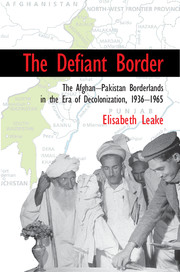Book contents
- Frontmatter
- Contents
- Preface and Acknowledgments
- List of Abbreviations
- Maps
- Introduction: “A Doughty and Honourable Opponent”: Historicizing the Afghan– Pakistan Borderlands
- 1 “Using a Crowbar to Swat Wasps”: The Frontier Tribal Area in Imperial Defense
- 2 The “Opening of Sluice- Gates”: Plan Partition and the Frontier
- 3 “We Are One People and Ours Is a Land”: The Demand for Pashtunistan, 1948–1952
- 4 A “Friendly Point of Return”: Pakistan and the Global Cold War
- 5 An “Eye for an Eye”: Mohammad Ayub Khan and the Collapse of Regional Relations
- Conclusion: “Religion, Land, Lineage and Honour”: The Afghan–Pakistan Borderlands Then and Now
- Index
Conclusion: “Religion, Land, Lineage and Honour”: The Afghan–Pakistan Borderlands Then and Now
Published online by Cambridge University Press: 20 January 2017
- Frontmatter
- Contents
- Preface and Acknowledgments
- List of Abbreviations
- Maps
- Introduction: “A Doughty and Honourable Opponent”: Historicizing the Afghan– Pakistan Borderlands
- 1 “Using a Crowbar to Swat Wasps”: The Frontier Tribal Area in Imperial Defense
- 2 The “Opening of Sluice- Gates”: Plan Partition and the Frontier
- 3 “We Are One People and Ours Is a Land”: The Demand for Pashtunistan, 1948–1952
- 4 A “Friendly Point of Return”: Pakistan and the Global Cold War
- 5 An “Eye for an Eye”: Mohammad Ayub Khan and the Collapse of Regional Relations
- Conclusion: “Religion, Land, Lineage and Honour”: The Afghan–Pakistan Borderlands Then and Now
- Index
Summary
James W. Spain, a U.S. diplomat who served in Pakistan shortly after partition, returned to the frontier tribal area in the 1990s. In his subsequent book, Pathans of the Latter Day, he marveled, “To me, the most important fact is that the Pathans are basically the same now as when I first met them. They live in the same places and share the same values. They remain concerned above all with religion, land, lineage and honour.” While these were Spain's personal feelings, they hardly seem fair as a historical assessment of developments in Pakistan's frontier tribal zone. By the time Spain returned to the Afghan–Pakistan borderlands, upheaval had rocked the region: a series of regime changes within Pakistan, the secession of Bangladesh, a coup in Afghanistan by Mohammad Daud Khan, Daud's subsequent assassination, and finally the Soviet invasion of Afghanistan. In the arduous insurgency against the Soviets, Pakistan's frontier tribal area served as a primary contact point for the entrance of money, weapons, and men into Afghanistan. Ironically, the fluid border, which had led to so many disputes in years past, allowed for easier transport of goods into the occupied country.
So did the frontier tribal area of the 1990s resemble the frontier tribal area of the 1930s, 1940s, 1950s, and 1960s? In some ways, yes. The political integration of the tribal zone into the Pakistani state remained unfulfilled, and in this way, local Pashtuns largely remained as autonomous as they had in previous decades. But the Government of Pakistan also had continued endeavors to expand economic and social networks. As a government servant in the 1970s, anthropologist Akbar Ahmedargued that Zulfikar Ali Bhutto's reign served as a watershed moment in tribal policy, specifically from 1973–4:
Suddenly schools and dispensaries were being constructed in areas which could not boast a single cement building. Suddenly tractors and bulldozers worked in areas that had never seen even a bicycle. Suddenly roads were pushing their way through hitherto inaccessible areas and tribes. In their wake came light – literally, with the electric poles that followed the roads[,] and metaphorically[,] with the changing psychology of the tribesmen.
- Type
- Chapter
- Information
- The Defiant BorderThe Afghan-Pakistan Borderlands in the Era of Decolonization, 1936–65, pp. 237 - 254Publisher: Cambridge University PressPrint publication year: 2016



